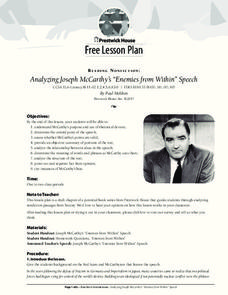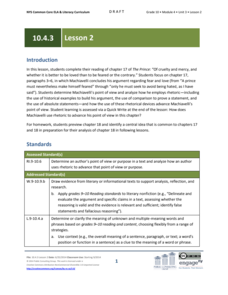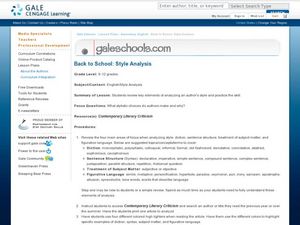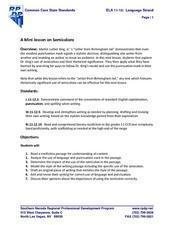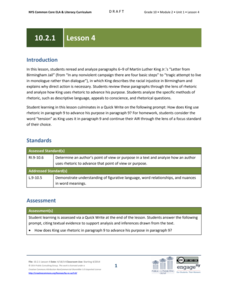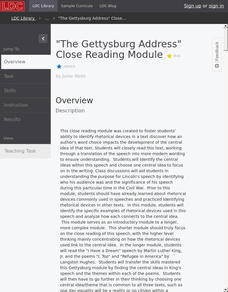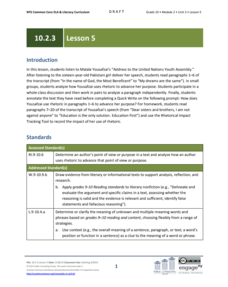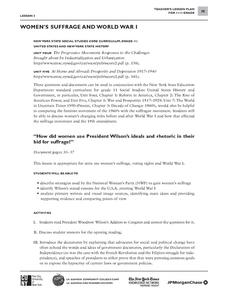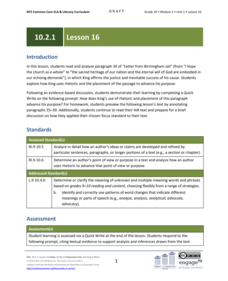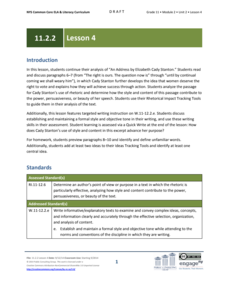Prestwick House
Rhetorical Devices in Political Speeches
Have you ever watched a political speech and felt your heart beat a little faster, and your opinion either solidify or begin to slightly change? Rhetorical devices can be a strong tool in an effective and powerful speech. A short...
John F. Kennedy Presidential Library & Museum
Analyzing the Rhetoric of JFK’s Inaugural Address
“And so, my fellow Americans: ask not what your country can do for you—ask what you can do for your. country.” Did you know that John Kenneth Galbraith, Adlai Stevenson, and Theodore Sorensen helped John F. Kennedy craft his 1961...
Curated OER
100 Questions
Learners practice problem solving skills by asking questions and participating in a design challenge. In this asking questions lesson, students work in pairs to ask questions to design a solution for a difficult personal problem....
EngageNY
Reading Closely and Introducing Rhetoric Toolbox: Unions as Agents of Change—Part 1
Scholars explore the question of whether labor unions are the agents of change as they continue reading César Chávez's 1984 speech, "Address to the Commonwealth Club of California." They discuss rhetoric in Chávez's speech and discover...
Prestwick House
Reading Nonfiction: Analyzing Joseph McCarthy's "Enemies from Within" Speech
Looking for a lesson that teaches class members how to analyze nonfiction? Use Joseph McCarthy's famous "Enemies from Within" speech as a instructional text. Worksheet questions direct readers' attention to the many historical...
Smithsonian Institution
Cuban Missile Crisis
The United States—specifically John F. Kennedy—played a large role during the Cuban Missile Crisis. A history resource poses questions that encourage critical thinking as well as in-depth analysis of images from the time period.
Curated OER
Rhetoric and War
Students examine the relationship between rhetoric and war. In this history of war instructional activity, students analyze paintings, photographs, movies, and articles that paint an opinionated picture of war....
EngageNY
Grade 10 ELA Module 4: Unit 3, Lesson 2
How do rhetorical devices advance an author's point of view? Scholars consider this question as they continue exploring Machiavelli's The Prince. They work in small groups, annotating the text for evidence of rhetoric before engaging in...
EngageNY
Grade 11 ELA Module 2: Unit 1, Lesson 21
Is there power in persuasion? After reading paragraphs six and seven of Booker T. Washington's "Atlanta Compromise" speech, learners look at how Washington uses rhetoric and carefully planned word choice to add to the persuasiveness of...
EngageNY
Grade 10 ELA Module 2: Unit 1, Lesson 8
Readers analyze paragraphs from the "Letter From Birmingham Jail" and determine King's purpose and how he supports it. Scholars discuss given questions with their peers, learn new vocabulary words, and complete a quick writing prompt.
Channel Islands Film
Cache: Lesson Plan 3 - Grades 4-5
Should the excavation of what is believed to be the cave of the Lone Woman of San Nicholas Island be allowed to continue? As a practice exercise designed to prepare pupils for a timed writing exam, individuals read two Los Angeles...
Curated OER
Back to School: Style Analysis
Jump back into expository writing and analysis at the start of a new school year! Start with a review of an authors' stylistic choices in diction, syntax, treatment of subject matter, and figurative language. Writers choose a text to...
Curated OER
Eloquent Words
Logan’s Lament, a speech delivered by Mingo Chief Logan in 1774, provides pupils with an opportunity to not only study the historical events surrounding the battle between Native Americans and the Europeans for the West Virginia...
Southern Nevada Regional Professional Development Program
A Mini lesson on Semicolons
Dr. Martin Luther King, Jr.'s "Letter from Birmingham Jail" serves as an exemplar for a mini-lesson on semicolons. Working alone or in small groups, class members first circle all the semicolons in the letter, and then consider how this...
Curated OER
Charles Darwin Meets John Paul II
If you teach AP English language and composition and are looking for a way to address the differences between written and spoken arguments, consider this lesson. Over the course of three days, class members research Charles Darwin or...
EngageNY
Grade 10 ELA Module 2: Unit 1, Lesson 4
Just read between the lines. Scholars analyze rhetorical devices in Martin Luther King Jr.'s letter by first discussing them with guided questioning. They then complete a rhetorical impact tracking tool before finishing the lesson plan...
Literacy Design Collaborative
"The Gettysburg Address" Close Reading Module
It's time to think deep and narrow. Scholars focus close reading on one short text but task take their thinking to a deep level. Readers use a Rhetorical Analysis Chart to analyze The Gettysburg Address and determine how Lincoln used...
EngageNY
Grade 10 ELA Module 2: Unit 3, Lesson 5
A person doesn't have to be an adult to make a difference! Scholars examine a speech by a 16-year-old girl. They discuss her word use, answer guided questions, and complete a rhetorical tracking tool. Readers end their analyses by...
City University of New York
Woman's Suffrage and World War I
How did women use President Wilson's ideals and rhetoric in their bid for suffrage? To answer this essential question, class groups analyze primary written documents and visual images.
EngageNY
Grade 10 ELA Module 2: Unit 1, Lesson 16
Take your place in the world—or the text. Scholars look at how the placement of a particular paragraph adds to the meaning of "Letter from Birmingham Jail" by Martin Luther King Jr. Before working on a quick write activity; readers...
EngageNY
Grade 11 ELA Module 2: Unit 2, Lesson 4
How does style contribute to the power and persuasiveness of a speech? With the question in mind, scholars continue reading "An Address by Elizabeth Cady Stanton." They complete a Rhetorical Impact Tracking Tool to guide them in their...
Museum of Tolerance
Disenfranchised People of the New Nation
Why are some immigrant groups in the United States embraced while others become disenfranchised? To answer this question, teams investigate why groups emigrated to the US, why some of these these peoples were...
C-SPAN
Should States Shift to Mail-In Voting during the Coronavirus Pandemic?
With the coronavirus pausing many norms in American society, officials are trying to decide how to safely hold voting in the 2020 presidential election. Using curated video clips, including speeches from Congress, journalists, and...
EngageNY
Grade 10 ELA Module 2: Unit 1, Lesson 15
Some things are worth doing again. Scholars take a look to see which ideas Martin Luther King Jr. revisits and refines in his "Letter from Birmingham Jail." To help with the process, readers answer guided questions, look at word...




